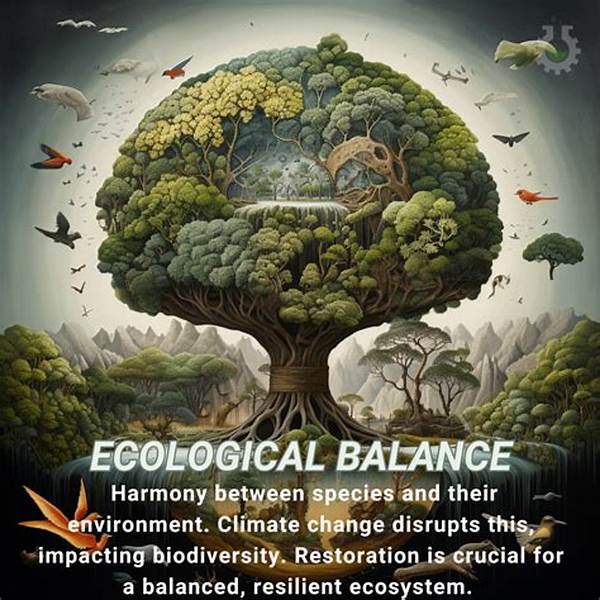Hey there, green warriors and peace advocates! Have you ever thought about how closely linked our environment is to global harmony? We often think of peace as something achieved through diplomacy and treaties, but there’s an unsung hero in the quest for world peace: ecological balance. In today’s post, we’ll explore how maintaining our planet’s ecological balance could very well be a cornerstone for lasting global tranquility.
Read Now : Family-friendly Group Discounts Available
The Intricate Connection Between Ecology and Peace
Let’s dive into the fascinating correlation between having a healthy planet and a peaceful world. In our ever-evolving society, achieving ecological balance for world peace is more than just a lofty goal—it’s an absolute necessity. Think about this: when natural resources are scarce due to environmental degradation, conflicts arise. Nations vie for dwindling supplies, leading to tension and often violence.
On the flip side, when we achieve ecological balance, the resources needed to support life are more evenly distributed, reducing the potential for conflict. It sets the stage for collaboration rather than competition. Imagine if nations could pool resources and technologies to combat environmental issues together. Such efforts could foster mutual respect and understanding, building bridges where walls once stood.
Moreover, ecological balance for world peace isn’t just good for preventing conflicts—it’s deeply intertwined with human rights. Access to clean water, air, and fertile land shouldn’t be privileges but rights accessible to all. Achieving ecological balance ensures these rights are met, contributing to a more just, peaceful world.
How Ecological Balance Promotes Harmony
1. Resource Sharing: Ecological balance for world peace encourages nations to share and manage resources sustainably, reducing competition and fostering cooperation.
2. Mitigation of Climate Change: By maintaining ecological balance, we can effectively combat climate change, which is a catalyst for societal instability and conflict.
3. Preservation of Biodiverse Systems: Healthy ecosystems are less prone to disastrous events that can lead to humanitarian crises and increase the risk of conflict.
4. Economic Stability: Sustainable practices that promote ecological balance often lead to economic health, which can prevent poverty-driven disputes.
5. Social Justice: Ecological balance ensures equitable access to natural resources, crucial for reducing tensions arising from disparity and injustice.
Ecological Balance and Global Diplomacy
The role of ecological balance for world peace can’t be understated when it comes to international diplomacy. Picture this: treaties that not only address political boundaries but also focus on shared environmental responsibilities. This form of environmental diplomacy can be incredibly effective in building partnerships among countries.
Nations often overlook the opportunities that lie within collaborative environmental endeavors. Projects like river clean-ups, forest conservation, and renewable energy development foster a sense of shared purpose. They offer a platform for dialogue that transcends political and cultural differences, setting the foundation for lasting peace.
Furthermore, ecological balance for world peace could redefine global governance structures. Imagine if international bodies prioritized environmental stability as much as they do economic development. We’d likely see a shift toward more holistic approaches to peacekeeping—approaches that address the root causes of conflict by nurturing our planet.
The Benefits of Ecological Peace Initiatives
1. Improved Relations: Countries working together on environmental projects tend to develop stronger bilateral ties.
2. Educational Opportunities: Joint ecological efforts often lead to an exchange of knowledge, fostering mutual understanding.
3. Inspiring Future Generations: Witnessing successful ecological collaborations can inspire younger generations to value peace over conflict.
4. Healthier Populations: A balanced ecosystem leads to better public health outcomes, which can decrease tensions and improve quality of life.
Read Now : Exclusive Paradise Honeymoon Destinations
5. Cultural Exchange: Global ecological initiatives promote the sharing of cultural practices that advocate sustainable living.
6. Innovation and Technology: Collaborations can spark technological advancements that benefit all.
7. Reduce Poverty: Environmental stability can lead to economic growth, reducing poverty-driven instability.
8. Food Security: Balanced ecosystems ensure agricultural sustainability, alleviating hunger-induced conflicts.
9. Disaster Resilience: Nations with robust ecosystems are better equipped to handle natural disasters, reducing crisis-triggered tensions.
10. A Stronger Global Community: Shared environmental goals can unite diverse nations in a common cause.
Practical Steps Toward a Peaceful Ecosystem
Real talk: achieving ecological balance for world peace won’t happen overnight, but small steps can make a big difference. From local community clean-ups to international policies focused on reducing carbon footprints, every action counts. Just imagine a world where all levels of society actively participate in ecological preservation.
One fundamental step is education. By raising awareness about the intimate link between ecology and peace, we can motivate people across the globe to act consciously. Community initiatives can serve as micro-models for larger internationalprojects, turning peace efforts into tangible, everyday realities.
Additionally, harnessing technology and innovation can usher us toward ecological balance more swiftly. Imagine smart cities powered by renewable energy, or agriculture practices driven by sustainable technologies. These innovations not only support ecological balance but also create a more harmonious world by reducing the elements that often spark conflict.
The Future of Peace and Ecology
In wrapping up our journey through ecological balance for world peace, let’s contemplate what happens when we prioritize the planet as an integral player in peace strategies. The potential is awe-inspiring. By investing in our environment as a conduit for peace, we simultaneously solve environmental, social, and political challenges.
The future could see us moving away from traditional peace talks that are solely politically driven, to a more integrated approach that includes sustainable living as a cornerstone. Imagine peace treaties that come with environmental action plans, ensuring long-term stability and harmony.
Beyond the immediate benefits, focusing on ecological balance for world peace offers hope—hope that our planet, with all its diverse life, can coexist peacefully. The ripple effects of such harmony would be global and generational, fostering a culture that values every living creature and every square inch of fertile ground. It’s a vision of peace not just as a goal, but as a lived reality.



